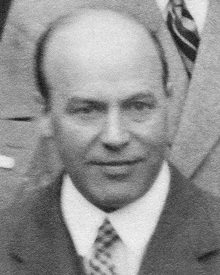Edward Andrade facts for kids
Quick facts for kids
Edward Andrade
|
|
|---|---|

Edward Andrade, 1934 at London
|
|
| Born |
Edward Neville da Costa Andrade
27 December 1887 |
| Died | 6 June 1971 (aged 83) London
|
| Education | St. Dunstan's College, Catford |
| Alma mater | University College London |
| Known for | Andrade's creep law Andrade equation Gamma rays |
| Awards | Hughes Medal (1958) Wilkins Lecture (1949) Holweck Medal (1947) Guthrie Lecture (1941) Fellow of the Royal Society (1935) |
| Scientific career | |
| Doctoral advisor | Prof Philipp Lenard |
Edward Neville da Costa Andrade (born December 27, 1887 – died June 6, 1971) was an English scientist. He was a physicist, a writer, and even a poet! He once explained that his last name, Andrade, sounds like "and-raid."
In science, Edward Andrade is famous for two main things. First, he worked with another great scientist, Ernest Rutherford. Together, they figured out the exact wavelength of a type of gamma radiation. They showed that these gamma rays had much higher energy than X-rays, which were known at that time. Second, he created a scientific model called "Andrade's creep law." This model helps explain how solid materials can slowly change shape under stress. Outside of science, many people knew him from his appearances on a popular radio show called The Brains Trust.
Contents
Life and Education
Edward Neville Andrade was born and grew up in London. His family came to London from Portugal a long time ago. He went to St Dunstan's College in Catford. This school was special because it was one of the first to have a science lab for high school students.
After St. Dunstan's, he studied at University College London. He earned a top degree in physics in 1907. He then continued his studies, focusing on how solid metals flow when they are under pressure. This was a topic he would study many times throughout his long career.
In 1910, Edward Andrade studied for his doctorate degree at the University of Heidelberg in Germany. His research there was about the electrical properties of flames.
Working with Ernest Rutherford
In 1914, Andrade worked with the famous scientist Ernest Rutherford in Manchester. They did important experiments together. They studied gamma-rays that came from radium. They were the first to measure the wavelengths of these rays. Their work showed that gamma rays had shorter wavelengths than the X-rays known at that time. Shorter wavelengths mean higher energy!
During the First World War, Andrade joined the Royal Artillery. After the war, in 1920, he became a Professor of Physics at the Ordnance College in Woolwich.
Career and Public Life
Edward Andrade became a Professor of Physics at University College, London in 1928. He held this position until 1950. After that, he became a Professor at the Royal Institution for three years.
In 1943, Andrade was invited to give the famous Royal Institution Christmas Lectures. These lectures are special science talks for young people. His first series was about Vibrations and Waves. In 1950, he gave another series of lectures on the same topic.
Andrade was also well-known as a broadcaster. He became famous during World War II for his appearances on the BBC radio show The Brains Trust. On this show, experts would answer questions from the public.
Books by Edward Andrade
Edward Andrade wrote many books to explain science to a wider audience. Some of his books include:
- The Structure of the Atom (1923)
- Engines (1928)
- The Mechanism of Nature (1930)
- Simple Science (with Julian Huxley)
- Sir Isaac Newton (1950)
- An Approach to Modern Physics (1956)
- Physics for the Modern World (1962)
- Rutherford and the Nature of the Atom (1964)
His scientific papers and other writings are kept at the University of Leicester.
 | Roy Wilkins |
 | John Lewis |
 | Linda Carol Brown |

